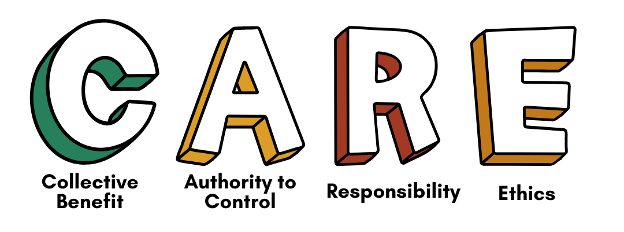How can we CARE more in environmental research?

Why should we CARE?
Whether you’re working on computational data analysis or conducting field surveys, considerations regarding data sensitivity and community impact should begin prior to any data collection. In a scientific landscape that encourages open data and open science, Indigenous data sovereignty and governance have become increasingly important yet can be overlooked. To combat this issue, the Global Indigenous Data Alliance (GIDA) formulated the CARE principles to protect the rights of Indigenous Peoples and nations and give them the ability to govern the collection, ownership, and use of their own data. CARE principles emphasize the human components of the data and urge researchers to prioritize human well-being in the context of open science and data sharing.
What is considered Indigenous data?
According to GIDA, Indigenous data includes data, information, and knowledge that has an impact on Indigenous Peoples, nations, and communities, either at the collective or individual level. This includes data about non-human relations (e.g., land, water, territories, plants, animals, etc), about Indigenous Peoples as individuals (e.g., administrative, legal, social, corporate, etc), and data about Indigenous Peoples as a collective (e.g., traditions, cultural information, languages, ancestral knowledges, etc).
What does CARE stand for?

The C stands for Collective Benefit, meaning that data ecosystems should function in ways that enable Indigenous Peoples to derive benefit from the data.

The A stands for Authority to Control, meaning that Indigenous Peoples’ rights and interests must be recognized and their authority to control Indigenous data be empowered.

The R stands for Responsibility. Those who work with Indigenous data have a responsibility to share how those data are used to support Indigenous Peoples’ self-determination and collective benefit.

The E stands for Ethics. Indigenous Peoples’ rights and well-being should be the primary concern at all stages of the data life cycle.
GIDA provides tips for supporting Indigenous data sovereignty, including:
- Acknowledge and advocating for sovereignty
- Prioritize Indigenous values when engaging with Indigenous communities
- Prioritize service to the community and support community-driven research
- Adhere to established tribal and Indigenous data governance practices and protocols.
- Support Indigenous scholars, both in their communities and within academic institutions.
- Involve Indigenous Peoples and scholars in decision-making processes, as co-authors, and as grant reviewers.
An example of CARE principles at NCEAS
 The Arctic Data Center (ADC), a collaborator of NCEAS, is the primary data repository for NSF-funded Arctic researchers. The ADC implements CARE principles by documenting ethical data procedures and tagging data sensitivity on submitted datasets.
The Arctic Data Center (ADC), a collaborator of NCEAS, is the primary data repository for NSF-funded Arctic researchers. The ADC implements CARE principles by documenting ethical data procedures and tagging data sensitivity on submitted datasets.
When researchers submit their data to the ADC, they are required to submit a statement outlining how their data collection procedures followed community standards for ethical research practices (ERPs, such as CARE principles) and to be very specific about any issues or steps that have been taken to ensure ethical practices. Recommended considerations include:
- Institutional review board approvals
- Consent waivers
- Procedures for co-production
- Data sovereignty
- Any steps to anonymize, aggregate, or de-identify the dataset
To assist with this process, the ADC has a newly updated site with resources for ethical research practices that provides tips for writing your ERP statement and some ethical concerns to consider depending on your field. They provide resources for general Arctic research, archeology and paleontology, human participation and sensitive data, marine sciences, physical sciences, plants and soil sciences, spatial data, and wildlife sciences.

When submitting data to the ADC, researchers are required to flag their data with the level of sensitivity, ranging from data that does not include any sensitive or protected information, data that is sensitive but has minimal risk because it has been anonymized or summarized to remote identifying information, or data that is sensitive and could cause harm or violate statues. If noted as a significant risk, the data curation time works with researchers to determine if published data can be altered to remove sensitive information and protect human subjects.
How can environmental scientists implement CARE?
 Building upon GIDA’s tips for supporting Indigenous data sovereignty, we would like to encourage environmental scientists to think about how CARE principles apply to their research and if there are any limitations or barriers to applying ethical research practices to their work. Some ethical research considerations include:
Building upon GIDA’s tips for supporting Indigenous data sovereignty, we would like to encourage environmental scientists to think about how CARE principles apply to their research and if there are any limitations or barriers to applying ethical research practices to their work. Some ethical research considerations include:
Research Planning
- Are there any permits or waivers required to carry out your research?
- Are there Indigenous communities in the region and have they been involved in the research planning process?
Data Collection
- Do you have a plan in place to respect the land and people where data are collected?
- Are local community members involved in the data collection process or overseeing the process?
Data Sharing & Publication
- Are you accounting for anonymity of participants/data, misrepresentation of results, improper authorship, plagiarism, or the falsification of data?
- Do your published results respect and honor Indigenous Peoples and have the results been approved for publication by these communities?
To learn more about CARE principles, visit https://www.gida-global.org/.
To learn more about ethical research practices in Arctic research, visit https://arcticdata.io/data-ethics/.
Watch our ADC community engagement & outreach coordinators present on “Implementing CARE: Best Practices for Ethical Research and Sensitive Data Documentation at the Arctic Data Center” as part of the Interagency Arctic Research Policy Committee’s (IARPC) CARE-ing for Arctic Data and Indigenous Data Sovereignty series here: CARE-ing for Arctic Data & Indigenous Data Sovereignty Series: Ethical Stewardship in Research.
